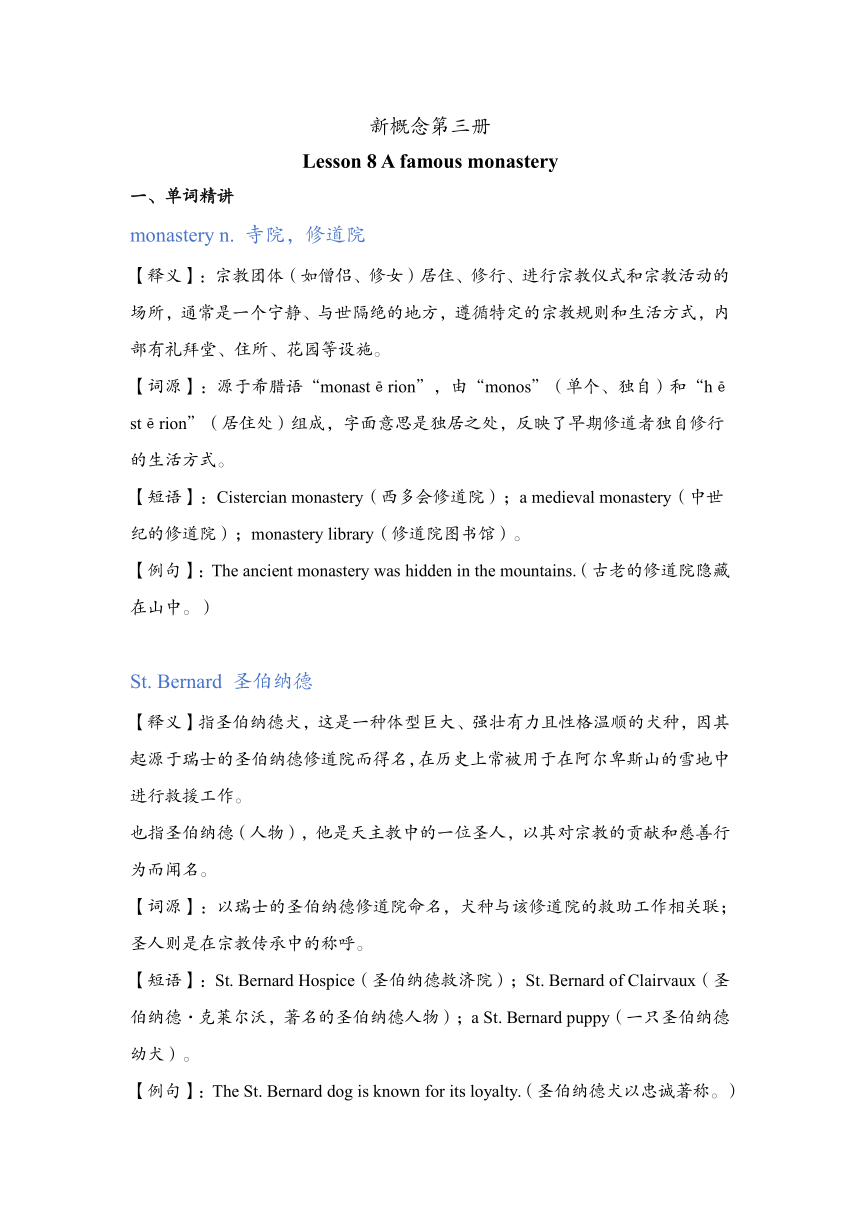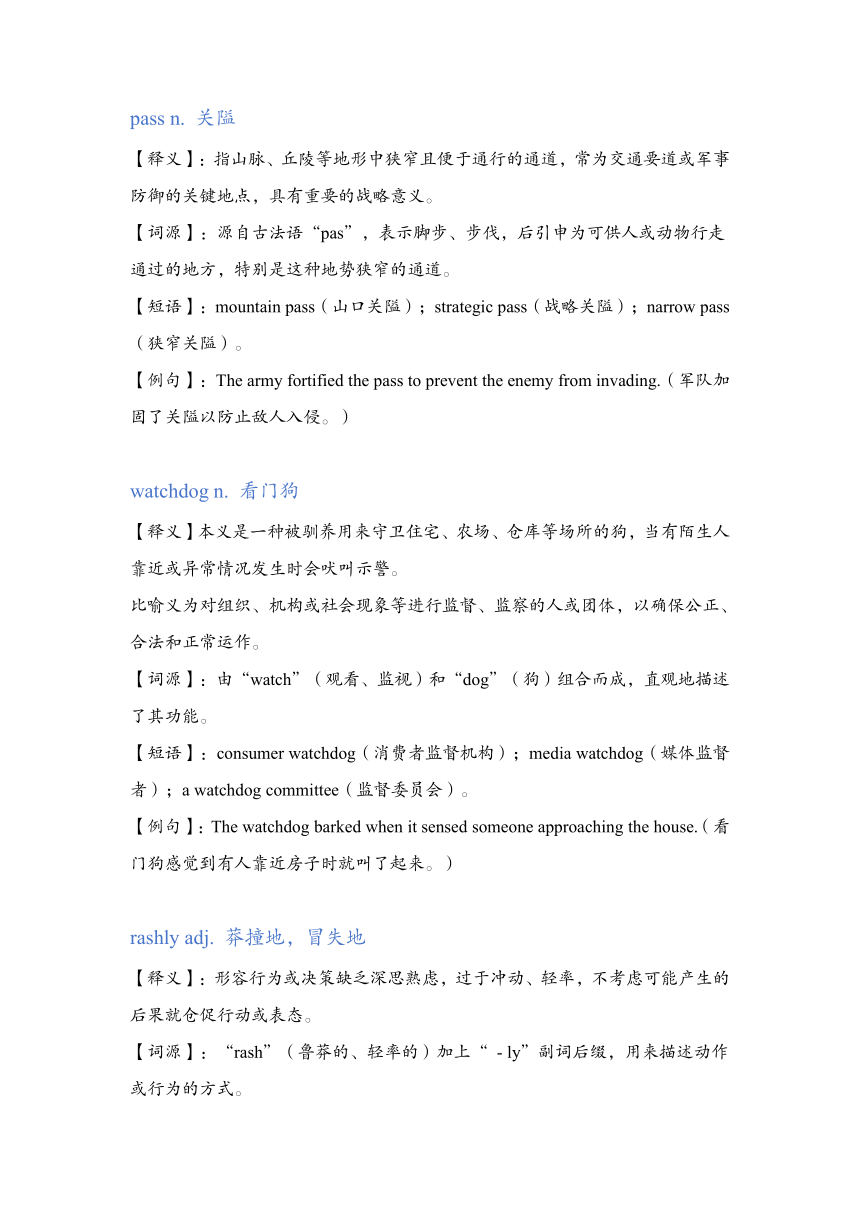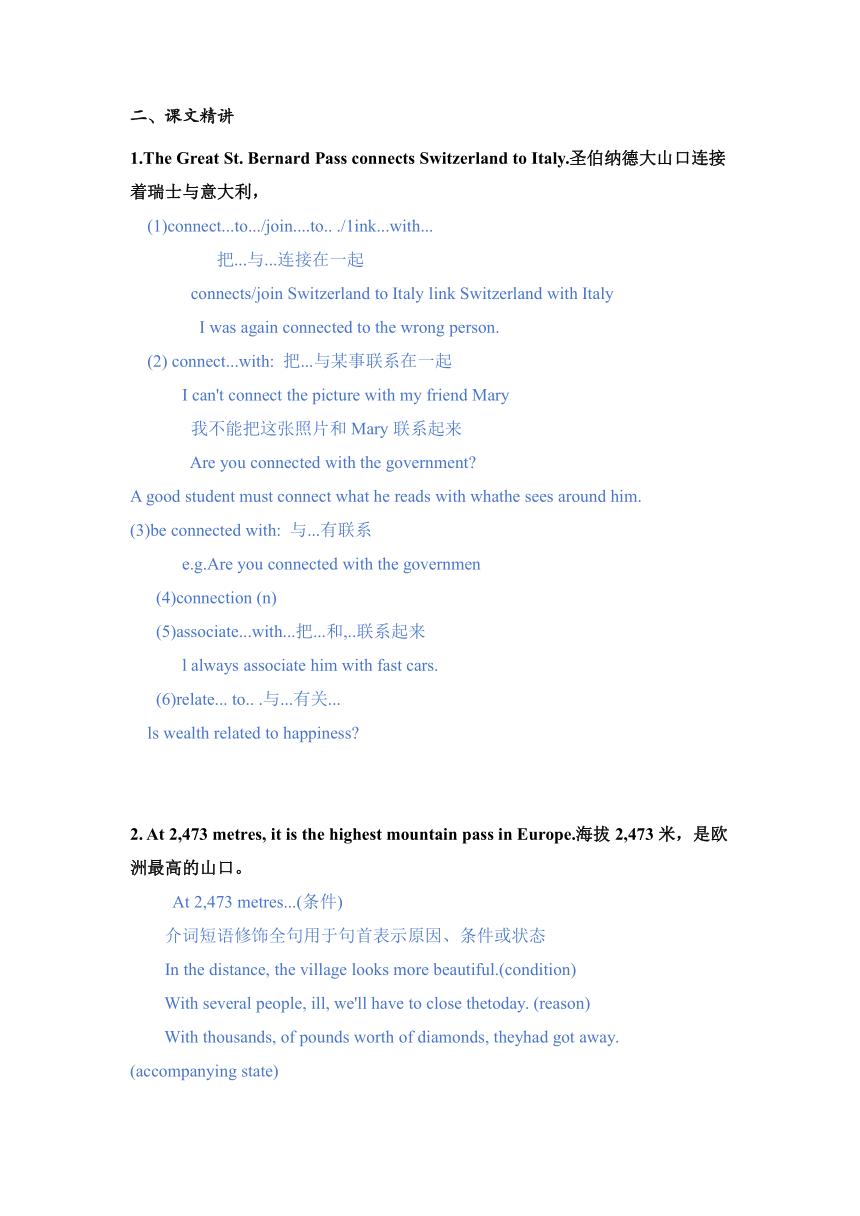新概念第三册Lesson 8 A famous monastery讲义
文档属性
| 名称 | 新概念第三册Lesson 8 A famous monastery讲义 |  | |
| 格式 | docx | ||
| 文件大小 | 164.6KB | ||
| 资源类型 | 教案 | ||
| 版本资源 | 新概念英语 | ||
| 科目 | 英语 | ||
| 更新时间 | 2024-12-04 14:07:14 | ||
图片预览





文档简介
新概念第三册
Lesson 8 A famous monastery
单词精讲
monastery n. 寺院,修道院
【释义】:宗教团体(如僧侣、修女)居住、修行、进行宗教仪式和宗教活动的场所,通常是一个宁静、与世隔绝的地方,遵循特定的宗教规则和生活方式,内部有礼拜堂、住所、花园等设施。
【词源】:源于希腊语“monastērion”,由“monos”(单个、独自)和“hēstērion”(居住处)组成,字面意思是独居之处,反映了早期修道者独自修行的生活方式。
【短语】:Cistercian monastery(西多会修道院);a medieval monastery(中世纪的修道院);monastery library(修道院图书馆)。
【例句】:The ancient monastery was hidden in the mountains.(古老的修道院隐藏在山中。)
St. Bernard 圣伯纳德
【释义】指圣伯纳德犬,这是一种体型巨大、强壮有力且性格温顺的犬种,因其起源于瑞士的圣伯纳德修道院而得名,在历史上常被用于在阿尔卑斯山的雪地中进行救援工作。
也指圣伯纳德(人物),他是天主教中的一位圣人,以其对宗教的贡献和慈善行为而闻名。
【词源】:以瑞士的圣伯纳德修道院命名,犬种与该修道院的救助工作相关联;圣人则是在宗教传承中的称呼。
【短语】:St. Bernard Hospice(圣伯纳德救济院);St. Bernard of Clairvaux(圣伯纳德·克莱尔沃,著名的圣伯纳德人物);a St. Bernard puppy(一只圣伯纳德幼犬)。
【例句】:The St. Bernard dog is known for its loyalty.(圣伯纳德犬以忠诚著称。)
pass n. 关隘
【释义】:指山脉、丘陵等地形中狭窄且便于通行的通道,常为交通要道或军事防御的关键地点,具有重要的战略意义。
【词源】:源自古法语“pas”,表示脚步、步伐,后引申为可供人或动物行走通过的地方,特别是这种地势狭窄的通道。
【短语】:mountain pass(山口关隘);strategic pass(战略关隘);narrow pass(狭窄关隘)。
【例句】:The army fortified the pass to prevent the enemy from invading.(军队加固了关隘以防止敌人入侵。)
watchdog n. 看门狗
【释义】本义是一种被驯养用来守卫住宅、农场、仓库等场所的狗,当有陌生人靠近或异常情况发生时会吠叫示警。
比喻义为对组织、机构或社会现象等进行监督、监察的人或团体,以确保公正、合法和正常运作。
【词源】:由“watch”(观看、监视)和“dog”(狗)组合而成,直观地描述了其功能。
【短语】:consumer watchdog(消费者监督机构);media watchdog(媒体监督者);a watchdog committee(监督委员会)。
【例句】:The watchdog barked when it sensed someone approaching the house.(看门狗感觉到有人靠近房子时就叫了起来。)
rashly adj. 莽撞地,冒失地
【释义】:形容行为或决策缺乏深思熟虑,过于冲动、轻率,不考虑可能产生的后果就仓促行动或表态。
【词源】:“rash”(鲁莽的、轻率的)加上“ - ly”副词后缀,用来描述动作或行为的方式。
【短语】:rush into things rashly(莽撞地仓促行事);answer rashly(冒失地回答)。
【例句】:He rashly invested all his savings without proper research.(他莽撞地在没有进行适当研究的情况下就把所有积蓄都投资了。)
enclosure n. 围场,圈地
【释义】:一块被栅栏、围墙、篱笆等障碍物围起来的土地或区域,可用于多种目的,如饲养家畜、种植作物、保护特定区域等。
【词源】:由“en -”(使进入某种状态)和“closure”(关闭、封闭)组成,表示使处于封闭状态的一块地方。
【短语】:enclosure fence(围场栅栏);animal enclosure(动物围场);fenced enclosure(有围栏的围场)。
【例句】:The zoo has different enclosures for various animals.(动物园为不同的动物设有不同的围场。)
monk n. 和尚
【释义】:是佛教中出家修行的男性,他们遵守佛教的教义、戒律,远离世俗生活,通过冥想、诵经等方式追求精神上的解脱和觉悟。
【词源】:源自古英语“munuc”,经过拉丁语“monachus”和希腊语“monachos”演变而来,最初表示独居者,体现了和尚修行时相对独立、清心寡欲的生活状态。
【短语】:Buddhist monk(佛教和尚);monk's cell(和尚的禅房);a devout monk(一位虔诚的和尚)。
【例句】:The monk chanted sutras every morning.(和尚每天早晨诵经。)
privacy n. 清静,隐居;隐私
【释义】表示个人享有独处、不受外界干扰的状态,追求内心的宁静和平和。
也指个人的私人信息、私人生活、私人空间等不被他人窥探、侵犯的权利。
【词源】:源自拉丁语“privatus”,表示私人的、个人的,加上“ - acy”名词后缀,表示与私人相关的状态或性质。
【短语】:right to privacy(隐私权);in the privacy of one's home(在自己家中的隐居生活中);violate someone's privacy(侵犯某人的隐私)。
【例句】:She cherished her privacy and rarely shared her personal thoughts.(她珍视自己的隐私,很少分享自己的个人想法。)
skier n. 滑雪者
【释义】:指参与滑雪运动的人,他们借助滑雪板在雪地上滑行,享受滑雪带来的乐趣或参加滑雪竞技活动。
【词源】:由“ski”(滑雪板)加上表示人的后缀“ - er”构成,表示使用滑雪板的人。
【短语】:expert skier(滑雪高手);recreational skier(休闲滑雪者);skier's equipment(滑雪者的装备)。
【例句】:The skier performed amazing stunts on the slopes.(滑雪者在雪坡上表演了惊人的特技。)
Easter n. 复活节
【释义】:是基督教最重要的节日之一,纪念耶稣基督的复活,日期通常在每年春分月圆后的第一个星期日。这个节日在西方文化中有广泛的影响,有许多特色的庆祝活动,如教堂礼拜、家庭聚会、寻找复活节彩蛋等。
【词源】:源自古英语“ēastre”,原本是一个日耳曼的春天女神的名字,后来被基督教吸收,成为纪念耶稣复活的节日名称,象征着新生和希望。
【短语】:Easter holiday(复活节假期);Easter parade(复活节游行);Easter lilies(复活节百合花)。
【例句】:Families get together to celebrate Easter every year.(家庭每年都会聚在一起庆祝复活节。)
二、课文精讲
1.The Great St. Bernard Pass connects Switzerland to Italy.圣伯纳德大山口连接着瑞士与意大利,
(1)connect...to.../join....to.. ./1ink...with...
把...与...连接在一起
connects/join Switzerland to Italy link Switzerland with Italy
I was again connected to the wrong person.
(2) connect...with: 把...与某事联系在一起
I can't connect the picture with my friend Mary
我不能把这张照片和Mary联系起来
Are you connected with the government
A good student must connect what he reads with whathe sees around him. (3)be connected with: 与...有联系
e.g.Are you connected with the governmen
(4)connection (n)
(5)associate...with...把...和,..联系起来
l always associate him with fast cars.
(6)relate... to.. .与...有关...
ls wealth related to happiness
2. At 2,473 metres, it is the highest mountain pass in Europe.海拔2,473米,是欧洲最高的山口。
At 2,473 metres...(条件)
介词短语修饰全句用于句首表示原因、条件或状态
In the distance, the village looks more beautiful.(condition)
With several people, ill, we'll have to close thetoday. (reason)
With thousands, of pounds worth of diamonds, theyhad got away. (accompanying state)
In red,she looks much more beautiful.
At the age of 25,he is able.
At one point 65 metres,he is a little short.
3.The famous monastery of St. Bernard, which was founded in the eleventh century, lies about a mile away.11世纪建造的著名的圣伯纳德修道院位于离山口1英里远的地方。
(1)lie:
to be or to stay in a position
He was lying on his back
The town lies in a valley
His real interest lies in music
Lie—lay-lain--lying
(2)which引导了非限制性定语从句
限制性定语从句和非限制性定语从句最大的区别
非限制性定语从句只是对主句或主句中所出现的某个名词的补充说明和解释去掉对主句影响不大,限制性定语从句是主句当中不可缺少的一部分。
Mr Smith was a famous person in American history.
Mr Smith who died on July 17th at 84,was a famous person in American history
There were very few passengers,who escaped without serious injury.
旅客很少,他们没有受到重伤都逃出来了。
There wer vey few passengers who excaped without serious injury.
没有受重伤而逃出来的旅客很少
The taxi drivers,who knew about the traffic jam,took another road.
所有司机都知道堵车的事,都走了别的路
The taxi drivers who knew about the traffic jam took another road,and others who didn't know about the traffic jam still took this heavy road.
得知堵车的司机走了别的路,不知道堵车事件的司机仍然走这条路
who引导的非限制性定语从句主要指人做主语
指代事物在非限制性定语从句当中只能使用which
He lent me a thousand dollars,which was exactly the sum I needed,
指代时间when、地点where
He was left on the desert island,where he stayed for as long as three weeks.
(3)found: 建立 set up eatablish
4.These friendly dogs, which were first brought from Asia, were used as watchdogs even in Roman times.这些最先从亚洲引进的狗,待人友好,早在罗马时代就给人当看门狗了。
which指代friendly dogs
The panda,which was brought from China,was used as a symbol of friendship
5.Now that a tunnel has been built through the mountains, the Pass is less dangerous,如今由于在山里开挖了隧道,翻越山口已不那么危险了。
Now that: 既然
用做时间连接词,后面通常跟完成式
Now that you have left university,you have to find a job.
用做原因连接词时,后面时态不限
Now that you won't help me,I must do the job myself.
既然你忙,就让我来给你做吧。
6.but each year, the dogs are still sent out into the snow whenever a traveller is in difficulty.但每年还要派狗到雪地里去帮助那些遇到困难的旅游者。
(1) whenever:无论何时
= no matter when
whoever,whatever,
wherever,whichever,however
= no matter who/what/where/which/how
You can telephone me whenever you like.
Whichever day you come,we'll be pleased to see you.
Wherever you go,I'll follow you.
However busy you are,you must spare some time to study English.
(2)in difficulty 处于困境,有困难
7.Despite the new tunnel, there are still a few people who rashly attempt to cross the Pass on foot.尽管修通了隧道,但仍有一些人想冒险徒步跨越圣伯纳德山口。
(1)despite: 介词,不管,尽管,不论
=in spite of
(2)attempt v.一尝试;试图 (~ to do sth.)
attempt to do something:try to do something
e.g. They ~ed to finish the work within a month.
n.尝试;试图
make an ~ to do sth.
(3)there + be
There are still a few students studying English in the classroom.
8.As there are so many people about, the dogs have to be kept in a special enclosure.由于来人太多,狗被关在专门的围栏里。
(1)about adv. 到处,周围=around
Don't litter waste paper about. look about go about run about
wander about,look about,go about,run about
hang about, fool about
(2)keep: 使某人或某物处于某种状态,经常和介词短语,形容词,分词(现在分词和过去分词)搭配使用,表示一种状态。
Keep him out.
Keep him in.
Do keep the cat in the room
表示逻辑的主谓关系--现在分词
I'm sorry to keep you waiting.
表示逻辑的动宾关系--过去分词
The lamb was kept tight to a tree
9.The temperature drops to -30o and very few people attempt to cross the Pass.气温下降到零下30度,试图跨越山口的人寥寥无几。
-30o 'minus thirty ( degrees centigrade )
→30 (degrees centigrade ) below zero
10.The monks prefer winter to summer for they have more privacy.修道士们喜欢冬天,而不太喜欢夏天。
(1)prefer something to something
The boy prefers apples to bananas.
The monks prefer winter to summer for they have more privacy.
(2) prefer doing to doing
I prefer reading to doing nothing.
prefer doing to talking喜欢做而不喜欢说
(3) prefer to do than do something
He prefers to read than do nothing
(4) prefer to do A rather than do B
=would rather do Athan do B
preference (n)偏爱
She prefers to study English in Beijing rather than study English abroad.
她宁愿在北京学习英语也不愿出国学习
prefer to die rather than surrender宁死不屈
preference (n)偏爱
11.The dogs have greater freedom, too, for they are allowed to wander outside their enclosure.因为在冬天,他们可以更多地过无人打扰的生活。
wander vi.徘徊:没有明确目标到处游荡
wander about[over]theworld漫游世界
wander through the woods徘徊于林中
12.The only regular visitors to the monastery in winter are parties of skiers who go there at Christmas and Easter.狗也比较自由,被放出围栏,四处遛达。冬天常来修道院参观的只有一批批滑雪者。
(1)regular (adj)定期的有规则的
the regular visitors to Beijing
regular breathing/heartbeat 有规律的呼及/心跳
regular verbs
regular meeting
regular job
regular offender
regular customer
regular occurrence
regular income
irregular (adj)不规则的
regularity (n)规律性
(2)parties of 一批批的
a party of一批人,一组人,一伙人
party派对,党派,契约或合同的一方
a birthday party
the Labour Party
a party of touriststhe
two parties involved in the dispute(纠纷)
Lesson 8 A famous monastery
单词精讲
monastery n. 寺院,修道院
【释义】:宗教团体(如僧侣、修女)居住、修行、进行宗教仪式和宗教活动的场所,通常是一个宁静、与世隔绝的地方,遵循特定的宗教规则和生活方式,内部有礼拜堂、住所、花园等设施。
【词源】:源于希腊语“monastērion”,由“monos”(单个、独自)和“hēstērion”(居住处)组成,字面意思是独居之处,反映了早期修道者独自修行的生活方式。
【短语】:Cistercian monastery(西多会修道院);a medieval monastery(中世纪的修道院);monastery library(修道院图书馆)。
【例句】:The ancient monastery was hidden in the mountains.(古老的修道院隐藏在山中。)
St. Bernard 圣伯纳德
【释义】指圣伯纳德犬,这是一种体型巨大、强壮有力且性格温顺的犬种,因其起源于瑞士的圣伯纳德修道院而得名,在历史上常被用于在阿尔卑斯山的雪地中进行救援工作。
也指圣伯纳德(人物),他是天主教中的一位圣人,以其对宗教的贡献和慈善行为而闻名。
【词源】:以瑞士的圣伯纳德修道院命名,犬种与该修道院的救助工作相关联;圣人则是在宗教传承中的称呼。
【短语】:St. Bernard Hospice(圣伯纳德救济院);St. Bernard of Clairvaux(圣伯纳德·克莱尔沃,著名的圣伯纳德人物);a St. Bernard puppy(一只圣伯纳德幼犬)。
【例句】:The St. Bernard dog is known for its loyalty.(圣伯纳德犬以忠诚著称。)
pass n. 关隘
【释义】:指山脉、丘陵等地形中狭窄且便于通行的通道,常为交通要道或军事防御的关键地点,具有重要的战略意义。
【词源】:源自古法语“pas”,表示脚步、步伐,后引申为可供人或动物行走通过的地方,特别是这种地势狭窄的通道。
【短语】:mountain pass(山口关隘);strategic pass(战略关隘);narrow pass(狭窄关隘)。
【例句】:The army fortified the pass to prevent the enemy from invading.(军队加固了关隘以防止敌人入侵。)
watchdog n. 看门狗
【释义】本义是一种被驯养用来守卫住宅、农场、仓库等场所的狗,当有陌生人靠近或异常情况发生时会吠叫示警。
比喻义为对组织、机构或社会现象等进行监督、监察的人或团体,以确保公正、合法和正常运作。
【词源】:由“watch”(观看、监视)和“dog”(狗)组合而成,直观地描述了其功能。
【短语】:consumer watchdog(消费者监督机构);media watchdog(媒体监督者);a watchdog committee(监督委员会)。
【例句】:The watchdog barked when it sensed someone approaching the house.(看门狗感觉到有人靠近房子时就叫了起来。)
rashly adj. 莽撞地,冒失地
【释义】:形容行为或决策缺乏深思熟虑,过于冲动、轻率,不考虑可能产生的后果就仓促行动或表态。
【词源】:“rash”(鲁莽的、轻率的)加上“ - ly”副词后缀,用来描述动作或行为的方式。
【短语】:rush into things rashly(莽撞地仓促行事);answer rashly(冒失地回答)。
【例句】:He rashly invested all his savings without proper research.(他莽撞地在没有进行适当研究的情况下就把所有积蓄都投资了。)
enclosure n. 围场,圈地
【释义】:一块被栅栏、围墙、篱笆等障碍物围起来的土地或区域,可用于多种目的,如饲养家畜、种植作物、保护特定区域等。
【词源】:由“en -”(使进入某种状态)和“closure”(关闭、封闭)组成,表示使处于封闭状态的一块地方。
【短语】:enclosure fence(围场栅栏);animal enclosure(动物围场);fenced enclosure(有围栏的围场)。
【例句】:The zoo has different enclosures for various animals.(动物园为不同的动物设有不同的围场。)
monk n. 和尚
【释义】:是佛教中出家修行的男性,他们遵守佛教的教义、戒律,远离世俗生活,通过冥想、诵经等方式追求精神上的解脱和觉悟。
【词源】:源自古英语“munuc”,经过拉丁语“monachus”和希腊语“monachos”演变而来,最初表示独居者,体现了和尚修行时相对独立、清心寡欲的生活状态。
【短语】:Buddhist monk(佛教和尚);monk's cell(和尚的禅房);a devout monk(一位虔诚的和尚)。
【例句】:The monk chanted sutras every morning.(和尚每天早晨诵经。)
privacy n. 清静,隐居;隐私
【释义】表示个人享有独处、不受外界干扰的状态,追求内心的宁静和平和。
也指个人的私人信息、私人生活、私人空间等不被他人窥探、侵犯的权利。
【词源】:源自拉丁语“privatus”,表示私人的、个人的,加上“ - acy”名词后缀,表示与私人相关的状态或性质。
【短语】:right to privacy(隐私权);in the privacy of one's home(在自己家中的隐居生活中);violate someone's privacy(侵犯某人的隐私)。
【例句】:She cherished her privacy and rarely shared her personal thoughts.(她珍视自己的隐私,很少分享自己的个人想法。)
skier n. 滑雪者
【释义】:指参与滑雪运动的人,他们借助滑雪板在雪地上滑行,享受滑雪带来的乐趣或参加滑雪竞技活动。
【词源】:由“ski”(滑雪板)加上表示人的后缀“ - er”构成,表示使用滑雪板的人。
【短语】:expert skier(滑雪高手);recreational skier(休闲滑雪者);skier's equipment(滑雪者的装备)。
【例句】:The skier performed amazing stunts on the slopes.(滑雪者在雪坡上表演了惊人的特技。)
Easter n. 复活节
【释义】:是基督教最重要的节日之一,纪念耶稣基督的复活,日期通常在每年春分月圆后的第一个星期日。这个节日在西方文化中有广泛的影响,有许多特色的庆祝活动,如教堂礼拜、家庭聚会、寻找复活节彩蛋等。
【词源】:源自古英语“ēastre”,原本是一个日耳曼的春天女神的名字,后来被基督教吸收,成为纪念耶稣复活的节日名称,象征着新生和希望。
【短语】:Easter holiday(复活节假期);Easter parade(复活节游行);Easter lilies(复活节百合花)。
【例句】:Families get together to celebrate Easter every year.(家庭每年都会聚在一起庆祝复活节。)
二、课文精讲
1.The Great St. Bernard Pass connects Switzerland to Italy.圣伯纳德大山口连接着瑞士与意大利,
(1)connect...to.../join....to.. ./1ink...with...
把...与...连接在一起
connects/join Switzerland to Italy link Switzerland with Italy
I was again connected to the wrong person.
(2) connect...with: 把...与某事联系在一起
I can't connect the picture with my friend Mary
我不能把这张照片和Mary联系起来
Are you connected with the government
A good student must connect what he reads with whathe sees around him. (3)be connected with: 与...有联系
e.g.Are you connected with the governmen
(4)connection (n)
(5)associate...with...把...和,..联系起来
l always associate him with fast cars.
(6)relate... to.. .与...有关...
ls wealth related to happiness
2. At 2,473 metres, it is the highest mountain pass in Europe.海拔2,473米,是欧洲最高的山口。
At 2,473 metres...(条件)
介词短语修饰全句用于句首表示原因、条件或状态
In the distance, the village looks more beautiful.(condition)
With several people, ill, we'll have to close thetoday. (reason)
With thousands, of pounds worth of diamonds, theyhad got away. (accompanying state)
In red,she looks much more beautiful.
At the age of 25,he is able.
At one point 65 metres,he is a little short.
3.The famous monastery of St. Bernard, which was founded in the eleventh century, lies about a mile away.11世纪建造的著名的圣伯纳德修道院位于离山口1英里远的地方。
(1)lie:
to be or to stay in a position
He was lying on his back
The town lies in a valley
His real interest lies in music
Lie—lay-lain--lying
(2)which引导了非限制性定语从句
限制性定语从句和非限制性定语从句最大的区别
非限制性定语从句只是对主句或主句中所出现的某个名词的补充说明和解释去掉对主句影响不大,限制性定语从句是主句当中不可缺少的一部分。
Mr Smith was a famous person in American history.
Mr Smith who died on July 17th at 84,was a famous person in American history
There were very few passengers,who escaped without serious injury.
旅客很少,他们没有受到重伤都逃出来了。
There wer vey few passengers who excaped without serious injury.
没有受重伤而逃出来的旅客很少
The taxi drivers,who knew about the traffic jam,took another road.
所有司机都知道堵车的事,都走了别的路
The taxi drivers who knew about the traffic jam took another road,and others who didn't know about the traffic jam still took this heavy road.
得知堵车的司机走了别的路,不知道堵车事件的司机仍然走这条路
who引导的非限制性定语从句主要指人做主语
指代事物在非限制性定语从句当中只能使用which
He lent me a thousand dollars,which was exactly the sum I needed,
指代时间when、地点where
He was left on the desert island,where he stayed for as long as three weeks.
(3)found: 建立 set up eatablish
4.These friendly dogs, which were first brought from Asia, were used as watchdogs even in Roman times.这些最先从亚洲引进的狗,待人友好,早在罗马时代就给人当看门狗了。
which指代friendly dogs
The panda,which was brought from China,was used as a symbol of friendship
5.Now that a tunnel has been built through the mountains, the Pass is less dangerous,如今由于在山里开挖了隧道,翻越山口已不那么危险了。
Now that: 既然
用做时间连接词,后面通常跟完成式
Now that you have left university,you have to find a job.
用做原因连接词时,后面时态不限
Now that you won't help me,I must do the job myself.
既然你忙,就让我来给你做吧。
6.but each year, the dogs are still sent out into the snow whenever a traveller is in difficulty.但每年还要派狗到雪地里去帮助那些遇到困难的旅游者。
(1) whenever:无论何时
= no matter when
whoever,whatever,
wherever,whichever,however
= no matter who/what/where/which/how
You can telephone me whenever you like.
Whichever day you come,we'll be pleased to see you.
Wherever you go,I'll follow you.
However busy you are,you must spare some time to study English.
(2)in difficulty 处于困境,有困难
7.Despite the new tunnel, there are still a few people who rashly attempt to cross the Pass on foot.尽管修通了隧道,但仍有一些人想冒险徒步跨越圣伯纳德山口。
(1)despite: 介词,不管,尽管,不论
=in spite of
(2)attempt v.一尝试;试图 (~ to do sth.)
attempt to do something:try to do something
e.g. They ~ed to finish the work within a month.
n.尝试;试图
make an ~ to do sth.
(3)there + be
There are still a few students studying English in the classroom.
8.As there are so many people about, the dogs have to be kept in a special enclosure.由于来人太多,狗被关在专门的围栏里。
(1)about adv. 到处,周围=around
Don't litter waste paper about. look about go about run about
wander about,look about,go about,run about
hang about, fool about
(2)keep: 使某人或某物处于某种状态,经常和介词短语,形容词,分词(现在分词和过去分词)搭配使用,表示一种状态。
Keep him out.
Keep him in.
Do keep the cat in the room
表示逻辑的主谓关系--现在分词
I'm sorry to keep you waiting.
表示逻辑的动宾关系--过去分词
The lamb was kept tight to a tree
9.The temperature drops to -30o and very few people attempt to cross the Pass.气温下降到零下30度,试图跨越山口的人寥寥无几。
-30o 'minus thirty ( degrees centigrade )
→30 (degrees centigrade ) below zero
10.The monks prefer winter to summer for they have more privacy.修道士们喜欢冬天,而不太喜欢夏天。
(1)prefer something to something
The boy prefers apples to bananas.
The monks prefer winter to summer for they have more privacy.
(2) prefer doing to doing
I prefer reading to doing nothing.
prefer doing to talking喜欢做而不喜欢说
(3) prefer to do than do something
He prefers to read than do nothing
(4) prefer to do A rather than do B
=would rather do Athan do B
preference (n)偏爱
She prefers to study English in Beijing rather than study English abroad.
她宁愿在北京学习英语也不愿出国学习
prefer to die rather than surrender宁死不屈
preference (n)偏爱
11.The dogs have greater freedom, too, for they are allowed to wander outside their enclosure.因为在冬天,他们可以更多地过无人打扰的生活。
wander vi.徘徊:没有明确目标到处游荡
wander about[over]theworld漫游世界
wander through the woods徘徊于林中
12.The only regular visitors to the monastery in winter are parties of skiers who go there at Christmas and Easter.狗也比较自由,被放出围栏,四处遛达。冬天常来修道院参观的只有一批批滑雪者。
(1)regular (adj)定期的有规则的
the regular visitors to Beijing
regular breathing/heartbeat 有规律的呼及/心跳
regular verbs
regular meeting
regular job
regular offender
regular customer
regular occurrence
regular income
irregular (adj)不规则的
regularity (n)规律性
(2)parties of 一批批的
a party of一批人,一组人,一伙人
party派对,党派,契约或合同的一方
a birthday party
the Labour Party
a party of touriststhe
two parties involved in the dispute(纠纷)
同课章节目录
